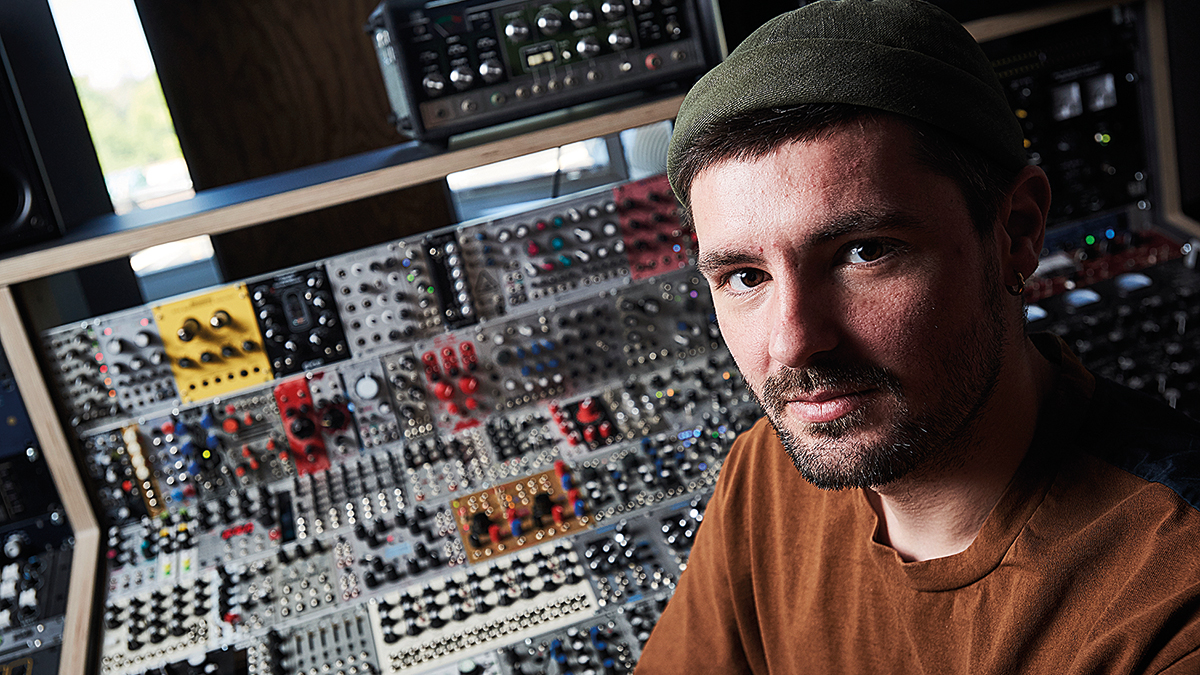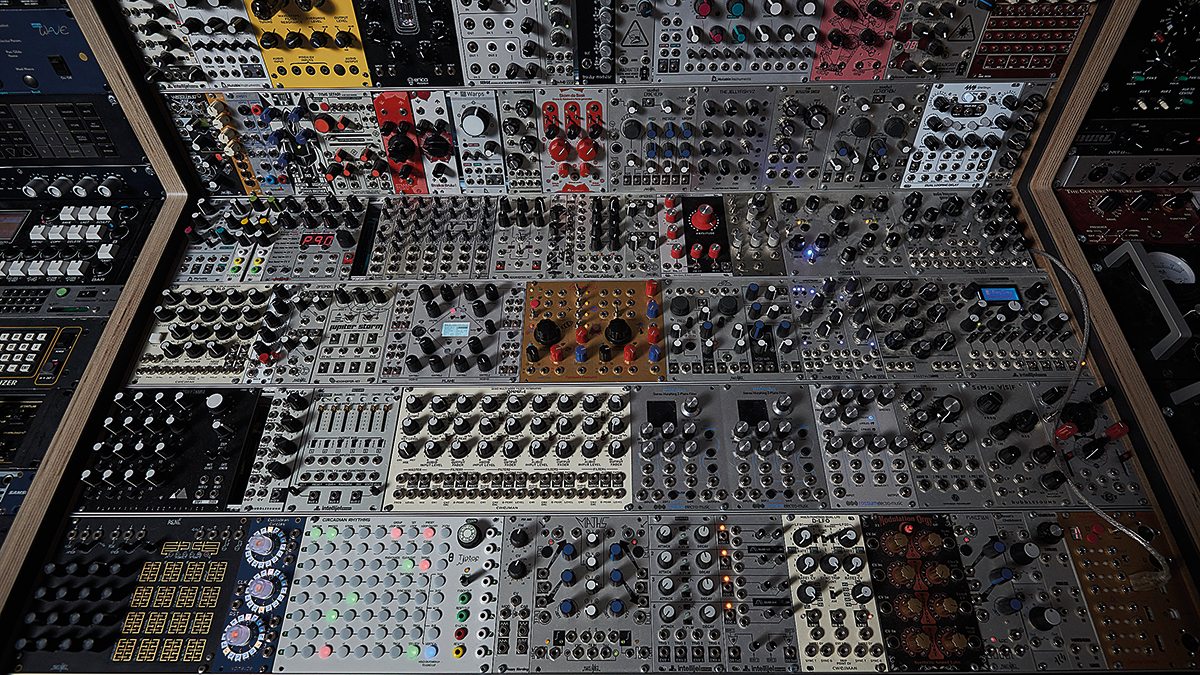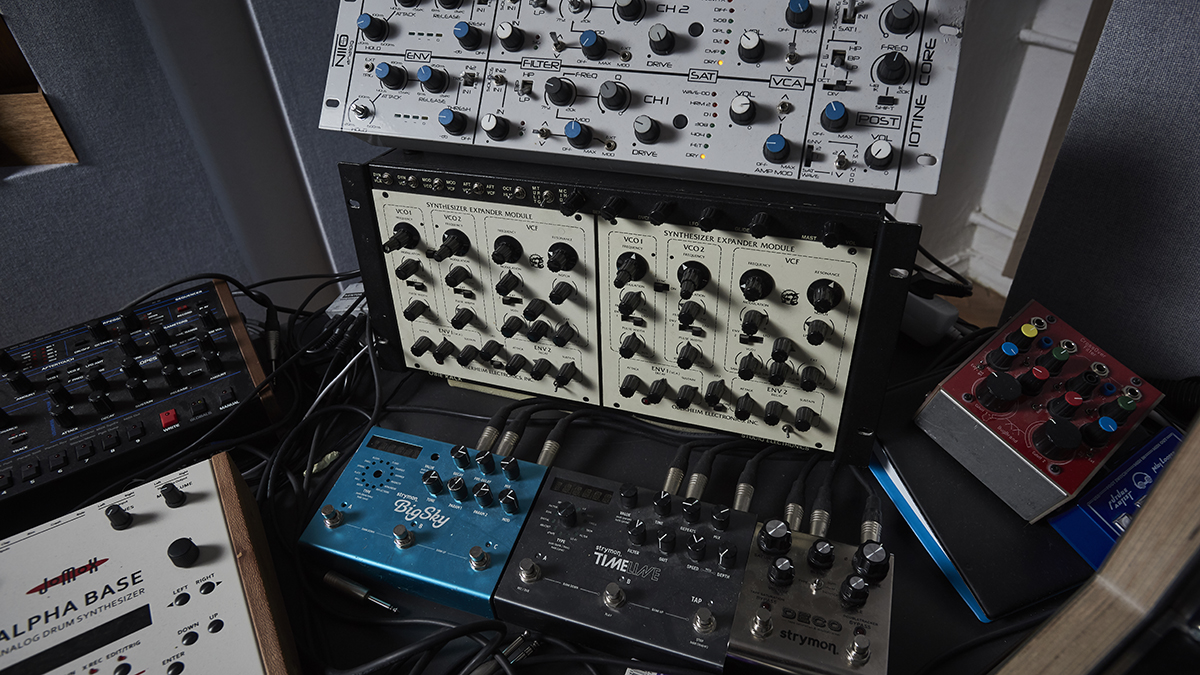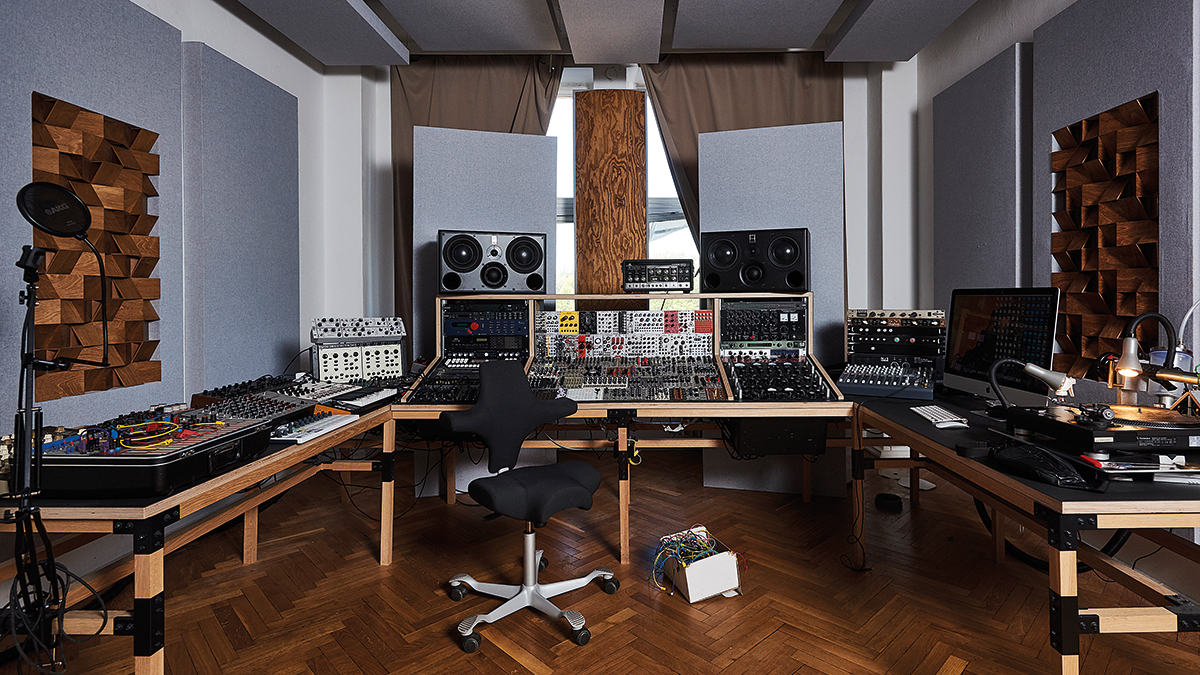Blawan: "I put the Why They Hide Their Bodies… track out, and was totally shocked by how popular it was. I was kind of like, ‘F***, I’ve made a big mistake here.’"
Yorkshire-born producer on his debut album, some unwanted attention and moving into the Funkhaus, Berlin

Want all the hottest music and gear news, reviews, deals, features and more, direct to your inbox? Sign up here.
You are now subscribed
Your newsletter sign-up was successful
Yorkshire-born producer Jamie Roberts rapidly caught the attention of the UK underground back in 2010, when he made his debut with a clutch of distinctive, impeccably produced tunes for taste-maker labels like Hessle Audio, R&S and Clone. His rise in the two years that followed was bordering on meteoric, propelled by a pair of tracks, released in quick succession, which both came as close as underground techno can to the status of a genuine crossover ‘hit’.
The first of these, Getting Me Down, saw Roberts flip the vocal of Brandy’s turn-of-the-millennium R&B jam I Wanna Be Down over an irresistible groove of heavily swung mid-range percussion, to create a club track that was infectiously catchy and massively hard-hitting in equal measure. The second, Why They Hide Their Bodies Under My Garage, paired an utterly sinister Fugees vocal sample with a throbbing, unstable-feeling beat, resulting in one of the most singular and distinctive techno tracks of recent times.
A forced break briefly cooled the career momentum, but recent years have also seen the eclecticism of Roberts’ early releases settle into a more consistent and recognisable sound, one focussed around hardware techno jams created on his envy-inducing modular rig. Alongside his solo releases Roberts has a string of notable collaborations, including Trade, with techno stalwart Surgeon, and his live, improvisational project Karenn, which sees him pair up with UK producer Arthur Cayzer, aka Pariah.
Now a resident of Berlin, Roberts has recently released his debut album, Wet Will Always Dry, a finely-crafted collection of rugged hardware-driven techno tracks. We caught up with Roberts in his production hub at the East German radio station turned studio complex, Funkhaus, to talk modules, vinyl and one-sided collaborations.
Listening back to your early releases, we’re guessing you weren’t using the modular rig in those days?
“I was just a student back then, making stuff in my bedroom. It was basically all Ableton. I was actually studying music programming in Scarborough, at a really nice university. They had loads of really crazy facilities, so actually a lot the sounds and samples in that early stuff was recorded in really nice studios, but it was all programmed in Ableton.”
When did you first start thinking about making the move to hardware?
Want all the hottest music and gear news, reviews, deals, features and more, direct to your inbox? Sign up here.
“When I had more money, basically. I had no money when I started, and didn’t until I started gigging. There was, like, a four year period where every penny I earned I spent on gear.”
Was that something you always planned on right from day one?
“Definitely. I was always lusting over that stuff but just couldn’t afford it. It’s still the same now though [laughs], I’m still spending way too much money on this stuff. But yeah, I would have had all of this earlier if I could afford it.”
Your sound has changed quite a bit in that time too. Is that a direct result of switching up gear?
“Yeah, completely, it’s all a result of what you’re using. But it’s been nearly ten years now, so I’m kind of glad that it has changed, otherwise it would be really boring.”
How long have you been here in Funkhaus?
“I’ve been here about a year and a half. I recorded my album and last two EPs here. It was a long process getting all the acoustic treatment and stuff sorted. Really it’s only been functional the last nine months, I suppose. Before then it was pretty much like an echo chamber.”
Have you done most of the work on it yourself?
“Yeah, with the help of another guy called Alexander Schubert who measured all the acoustics in the room and designed them.”

Is your modular rig pretty much the same now as when you made the album?
“Yeah, I haven’t really bought anything else. Everything has been pretty much unchanged for the last nine months.”
What are the key modules in there?
“On the last two EPs there’s something called Livewire Frequency Generator, which is like an oscillator but it’s got like six outputs and stuff. I think, unfortunately, the guy who builds them passed away a few years ago, so I’m not sure if they’re making them anymore. But that’s key to the sound of the last two EPs. Pretty much everything on there is coming from that. Then there’s a Serge Modular waveshaper. Those two things combined are literally the sound of the last two records.”
Are those things you purposely sought out to create a specific sound?
“Not really. I spent the last five years buying pretty much every module I could get my hands on. Then I quickly realised that there’s more shit stuff out there than there is good, so I get this stuff through doing some research to find out who’s actually really concentrating on the circuits and making good quality stuff. I came to the conclusion that I may as well just buy Cwejman and Livewire stuff, because they’re the two that are shining above the rest. That’s what made me buy the Livewire stuff. I love it so much that I can’t make a track without it now.”
That Music Easel we spotted on the way in is a great synth. Do you use that much?
“Yeah, I do actually. It’s great, it’s probably my favourite thing I’ve got, although I’ve not actually used it that many times in a track. It’s mostly been for messing around with, for making weird textures and soundscapes.”

Do you use much non-modular hardware?
“Yeah, it’s a bit sparse though, to be honest. The modular is like, 90% of the sound source for everything. Occasionally I use a couple of old Oberheim modules from the ’70s, but it’s mostly that and the modular system. I’ve got drum machines and stuff, but I’m never really getting the sound I want out of them.”
What’s providing the main drum sounds on your recent releases then?
“It’s all modular. Usually I’m just combining two oscillators and putting them through a low-pass gate to create percussion sounds. Sometimes I’ll process things quite heavily on the computer, to create drum sounds that way too. Obviously there’s a limit to what you can do [with the modular]. I’ve been doing a lot of spectral manipulation on the computer to create percussion with a bit more of an alien sound to it.”
What software do you use in your setup?
“I use Ableton, I have for years. Sometimes I’ll just do a stereo recording into Ableton, sometimes I’ll record stems in and then mess about with them. I use very few VST instruments, but if I do it’s mostly the FabFilter stuff. I also use Unfiltered Audio stuff, like the Dent VST – those are my go-to plugins.”
Do you tend to do most of the mixing process in software?
“No, it’s different from track to track. Some tracks are just done entirely as a stereo recording. The way my setup works, I’ve got four preamps and an eight-track mixer, and they just go straight into a Burl converter. It’s just a single stereo input, rather than multitracking. Sometimes I’ll just record a drum hit or something, but sometimes I’m recording full tracks from start to finish. It just depends how it all works out. Everything is done here in the studio though.”
You’ve been a pretty prolific collaborator. How has that influenced you as a producer?
I do a lot of collaborative projects, but I’m not really that good at collaborating. I kind of end up taking control.
“Massively. Not a lot of people know I’ve done a collaborative project with two Italians called the Analogue Cops, for the last nine years. They go under a few different guises, but it’s all pretty underground. I’ve got that, Trade, with Surgeon, Karenn, with Pariah, then a few others too… They’re all just kind of mates though; it’s like when you meet up with friends and makes some tunes.
“The Karenn thing stands out though, since that rose to a certain level and has been more successful than any of the others. It’s also the only time I’ve ever done a collaborative project in this studio, with the stuff we’ve been doing recently. Everything else has been me going to other people’s studios.”
How do you get on in other people’s studios? Do you tend to pick up new ideas?
“No, it’s a pain really [laughs]. I have to have everything set up a certain way. My studio is a bit of a mess right now – once I finish an album or something I kind of like to tear everything down and rejig it – but generally I have a pretty specific way of of working. Even when I’m even doing stuff with Arthur for the Karenn project, it has to be my way – I’m a bit selfish like that. Basically, I do a lot of collaborative projects, but I’m not really that good at collaborating. I kind of end up taking control.”
Is it the same sort of dynamic when you guys play live as Karenn?
“We do equal amounts but I would definitely say I’m the one shouting to take stuff out or change something. We do different things onstage, depending on our instruments. I’m using a modular and some effects and that’s it. Within that modular there’s a few different things going on though, with some drums and synths too. Actually when I play live solo, I use the same setup. I don’t even need to add anything else, there’s enough in that one setup to play a full set.”
What are the main elements of that live setup?
“The main thing is the kick, which is produced by a Jomox module. I think everyone has kind of caught on now that they’re the go-to thing for that. It just sounds really good, and you’ve got everything you need in there – waveshapers, compressors – so you don’t need to fill a whole row of modules just to create a kick.
“Then I use some of the Noise Engineering oscillators too. There’s actually quite a lot of digital stuff in there, there’s Braids, and some Cwejman modules. I guess the main thing is the Cwejman QMMF, which is a multi-mode filter. That’s basically the sound of everything – I could never play live without that thing. Then there’s a few other things in there that I change about from set to set.”

You mentioned using some effects live too…
“I use a lot of Strymon pedals. I take a few of those out with me, so I’ve got a few individual flangers and stuff, but then mainly I’m using the Big Sky.”
Do your live sets tend to be improvisational?
“It’s all improvised. With Karenn it’s been like that for years, since we live in different countries. It’s impossible to get together and plan anything.
“We have these Boss loopers that we use, they’re tabletop things that were marketed at beatboxers but they’re actually wicked for electronic music. I put my modular through one of those, then when I feel like I want to grab a lick or something I just hit record and it’s there.
“We’ve been using those for years, and they’re so simple, but they save every recording on every track you’ve ever done, so we’ve essentially got something like hundreds of hours of small recorded stems that we’ve put down over the years. Sometimes if we’re in the middle of a set and we can’t get an idea down, we’ll flick through those and bring some little lick out that we might have recorded three years ago or something. That’s really super helpful.”
Can we expect a Karenn album any time soon?
“No, but we’ve just finished a six-track EP. That’s only just finished actually, it’s not even mastered yet. It should be out by the end of the year though.
“We’ve been trying to collaborate in the studio for a while but something never really clicked. That’s the weird thing with me and Arthur, we’ve been playing improvised live sets nearly every week, but when we get in the studio it just doesn’t happen. We do that stuff all the time in front of people and it works, but then when we get on our own it’s like, flat… This last time was the only time that it’s actually worked, so we decided to put a nail in the coffin and call it a release.”
Going back to your recent album, there’s bits of vocal on there, are we right in thinking that’s your own voice?
“Yeah it is. I actually just recorded it pretty simply. I used a nice AKG condenser mic and put it through an Eventide H3000. I’ve been doing that for a while actually; everyone jumped on it with the album, but the last few EPs have all used my voice, I just never really told anyone before. It’s basically just me using my voice because I couldn’t find the right sequence on the modular. I’ll have an idea in my head and if I can’t get it another way, I’ll just get the mic out.”
Some of your early tracks were known for their prominent use of vocal samples. Do you ever use sampled vocals these days, or do you purposely steer clear of them?
“I haven’t done it for years, it’s definitely a conscious move though. It’s also because time moves on and you have to move on as well. There was a period where it was really cool to grab an acapella off of the internet and fuck about with it, but I think that time has passed now.”
With Getting Me Down and Why They Hide Their Bodies…, you came pretty close to crossing over into the mainstream club world, but then seemed to back away from it.
“I did a little bit, but I also got really ill and was forced to take a year-long break. It all happened around the same time. I put the Why They Hide Their Bodies… track out, and was totally shocked by how popular it was. I was kind of like, ‘Fuck, I’ve made a big mistake here’. It wasn’t really the sort of thing I wanted to do. Like you say, it was sort of crossing over into this mainstream world where people like Skrillex were jumping on it.”
Didn’t he make his own edit of that track?
I put the Why They Hide Their Bodies… track out, and was totally shocked by how popular it was. I was kind of like, ‘Fuck, I’ve made a big mistake here’.
“Yeah, this really horrible EDM edit. I remember, just after that happened, waking up and going on Twitter and there were thousands of people @ing me. I’ve met Skrillex before, and he’s a super nice guy, I’ve got nothing against him at all, but he definitely brought a level of attention that I wasn’t looking for. After that I tried to step back a bit, but then a few months later this thing hit me like a sledgehammer, I just got really ill and had to stop for a while. I guess it was like a blessing in disguise, even if it didn’t seem like it at the time.”
Was that when you moved out here to Berlin?
“I didn’t move until after I’d started to recover a bit. I just realised I needed to pack everything up, so I just left London and came out here. That was about three and a half years ago now. I always wanted to move here, but it never really happened. Then when I got ill and had a break it was like everything had reset. I wasn’t playing so many gigs anymore, the contract on my flat was coming to an end, so it was just the right moment.”
Is this setup in Funkhaus the first studio you’ve had out here?
“I actually built this huge desk I have here and had it in my apartment, which luckily was quite a big room. I was in there for a few months but was always looking for a proper room to rent. The problem is, places out here can be super expensive. I was looking at some places that wanted, like, 800 Euros a month for some 40-square metre room.
“Someone told me about Funkhaus and I assumed it would be expensive, but actually it’s super cheap. They’ve got loads of rooms here and at the time I think they were trying to attract more professional producers. I think I was exactly what they were looking for, so maybe they gave me a good rate [laughs].”
Tell us about the vinyl lathe you’ve got here. Are you cutting records directly to play out in your DJ sets?
“Yeah, exactly that. I’d never send these off to be pressed, they’re just for DJing really, but it means I can write a track, record it down and then play it in a club to get a good idea of how it’s going to sound. It’s a pretty nice bit of kit actually, I can get something like 6dB louder than a standard pressing from this, so it sounds pretty close to the original file. When I got it I was kind of skeptical that there might be some massive downside to using it, but I’m yet to find one to be honest.
“It’s made by this really eccentric German guy. You go to his house to learn to use it. But between the lathe and the encoding, it works out as something like 2500 Euros. Mastering houses charge an average of 100 Euros for the same thing, so after a few years it pays for itself easily.”

Wet Will Always Dry is out now via Ternesc. Keep up with the latest from Blawan on his Facebook page.


I'm the Managing Editor of Music Technology at MusicRadar and former Editor-in-Chief of Future Music, Computer Music and Electronic Musician. I've been messing around with music tech in various forms for over two decades. I've also spent the last 10 years forgetting how to play guitar. Find me in the chillout room at raves complaining that it's past my bedtime.